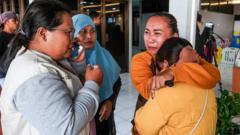As Indonesia grapples with a slowing economy, exacerbated by rising unemployment rates, President Prabowo Subianto has implemented a free school lunch program aiming to secure the nation’s future. However, this initiative has stirred controversy among economists who argue that it might worsen the country’s financial issues.
Rising Unemployment in Indonesia: A Dilemma Amid Free School Meals Initiative

Rising Unemployment in Indonesia: A Dilemma Amid Free School Meals Initiative
Indonesia's economy struggles as President Prabowo Subianto offers free lunches for students, with critics questioning the decision.
Nina Megayanti, a former marketing professional in Jakarta, illustrates the challenges many Indonesians face amid economic turmoil. Once enjoying a stable life, her situation changed drastically when she was laid off in 2023, reflecting a broader trend of rising unemployment impacting millions. The International Monetary Fund (IMF) projects Indonesia’s unemployment rate to reach 5 percent, highlighting a grim outlook only second to China in Asia.
In an effort to stimulate the economy, President Subianto has redirected substantial funds towards key programs, such as the school lunch initiative, affordable housing, and established a new sovereign wealth fund. Although his administration claims to achieve a 5 percent growth rate annually, critics like economist Awalil Rizky from the Bright Institute contend that these efforts are misguided, particularly as they cultivate austerity measures and layoffs among government contractors.
The government has lowered its economic growth expectations for 2025, indicating a response to mounting pressure and highlighting the disparity between government claims and actual economic performance. As Subianto's initiatives face scrutiny amid rising hardship, many are left to wonder whether free meals can indeed nourish a faltering economy.
In an effort to stimulate the economy, President Subianto has redirected substantial funds towards key programs, such as the school lunch initiative, affordable housing, and established a new sovereign wealth fund. Although his administration claims to achieve a 5 percent growth rate annually, critics like economist Awalil Rizky from the Bright Institute contend that these efforts are misguided, particularly as they cultivate austerity measures and layoffs among government contractors.
The government has lowered its economic growth expectations for 2025, indicating a response to mounting pressure and highlighting the disparity between government claims and actual economic performance. As Subianto's initiatives face scrutiny amid rising hardship, many are left to wonder whether free meals can indeed nourish a faltering economy.




















